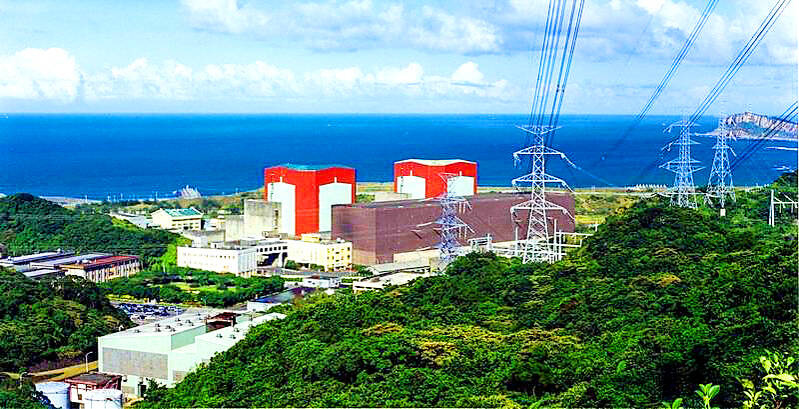The construction of outdoor casks for the storage of high-level radioactive waste for the Guosheng Nuclear Power Plant in New Taipei City’s Wanli District (萬里), the reactor units of which stopped operating in 2021 and last year respectively, is to start next year after getting approval from the New Taipei City Government last week.
However, the spent nuclear fuel could not be moved out for dry cask storage, a process that needs to be undertaken when a power plant is decommissioned, and guarantees safer storage than putting spent fuel in the liquid pool, Taiwan Power Co (Taipower, 台電) Vice President Tsai Chih-meng (蔡志孟) said on Friday.
The city government declined Taipower’s environmental protection proposal for several years, leading the company to file a lawsuit to the Taipei High Administrative Court in 2020, which moved the case to mediation earlier this year.

Photo courtesy of Taiwan Power Co
The mediation was completed in June and the city government approved Taipower’s “soil and water conservation plan” for dry cask construction this month, Tsai said.
More time would be needed for preparation before the construction officially begins early next year, Tsai said, adding that the spent fuel is expected to be moved out of the pool starting in late 2026.
At the same time, indoor dry casks are also scheduled to be built for more storage space, a Taipower spokesperson said.
While there have been calls to extend the life of the Guosheng Nuclear Power Plant following the completion of the outdoor dry casks, Tsai said the casks would allow for no more than five years of plant operation.
Indoor dry casks would have to be built for longer operations, but the extension of the plant’s license would have to be approved by the legislature and the necessary safety checks completed, he said.
The bid for the construction of indoor dry cask storage facilities for the Guosheng Nuclear Power Plant is expected to take place next year, Taipower said.
Meanwhile, outdoor dry cask storage facilities for the Jinshan Nuclear Power Plant in New Taipei City’s Shimen District (石門) were built in 2013, but never used after the city government discovered unapproved design changes.
The city government fined Taipower for the infraction and declined to approve a resubmitted proposal that included the design changes. Mediation was completed in April after Taipower filed a lawsuit, and the spent fuel is expected to be completely moved to dry casks by early 2026.

Taiwanese scientists have engineered plants that can capture about 50 percent more carbon dioxide and produce more than twice as many seeds as unmodified plants, a breakthrough they hope could one day help mitigate global warming and grow more food staples such as rice. If applied to major food crops, the new system could cut carbon emissions and raise yields “without additional equipment or labor costs,” Academia Sinica researcher and lead author the study Lu Kuan-jen (呂冠箴) said. Academia Sinica president James Liao (廖俊智) said that as humans emit 9.6 billion tonnes of carbon dioxide compared with the 220 billion tonnes absorbed

The Taipei Mass Rapid Transit (MRT) Wanda-Zhonghe Line is 81.7 percent complete, with public opening targeted for the end of 2027, New Taipei City Mayor Hou You-yi (侯友宜) said today. Surrounding roads are to be open to the public by the end of next year, Hou said during an inspection of construction progress. The 9.5km line, featuring nine underground stations and one depot, is expected to connect Chiang Kai-shek Memorial Hall Station to Chukuang Station in New Taipei City’s Jhonghe District (中和). All 18 tunnels for the line are complete, while the main structures of the stations and depot are mostly finished, he

Taipei is to implement widespread road closures around Taipei 101 on Friday to make way for large crowds during the Double Ten National Day celebration, the Taipei Department of Transportation said. A four-minute fireworks display is to be launched from the skyscraper, along with a performance by 500 drones flying in formation above the nearby Nanshan A21 site, starting at 10pm. Vehicle restrictions would occur in phases, they said. From 5pm to 9pm, inner lanes of Songshou Road between Taipei City Hall and Taipei 101 are to be closed, with only the outer lanes remaining open. Between 9pm and 9:40pm, the section is

China’s plan to deploy a new hypersonic ballistic missile at a Chinese People’s Liberation Army Rocket Force (PLARF) base near Taiwan likely targets US airbases and ships in the western Pacific, but it would also present new threats to Taiwan, defense experts said. The New York Times — citing a US Department of Defense report from last year on China’s military power — on Monday reported in an article titled “The missiles threatening Taiwan” that China has stockpiled 3,500 missiles, 1.5 times more than four years earlier. Although it is unclear how many of those missiles were targeting Taiwan, the newspaper reported